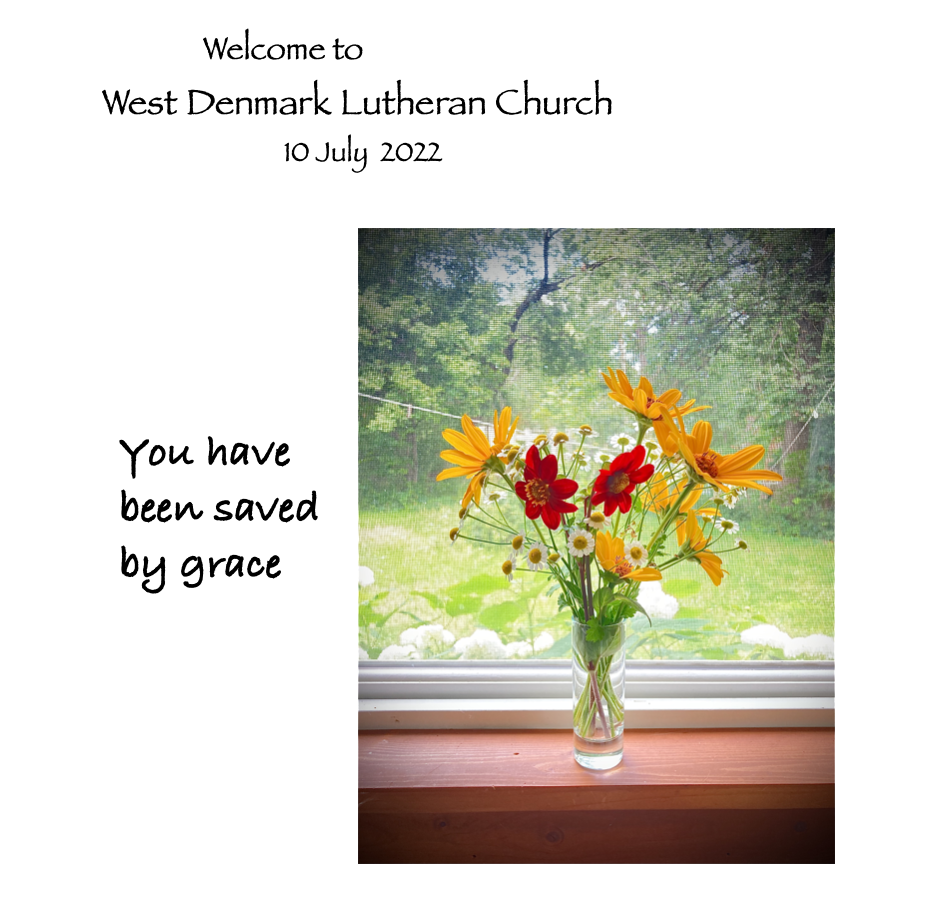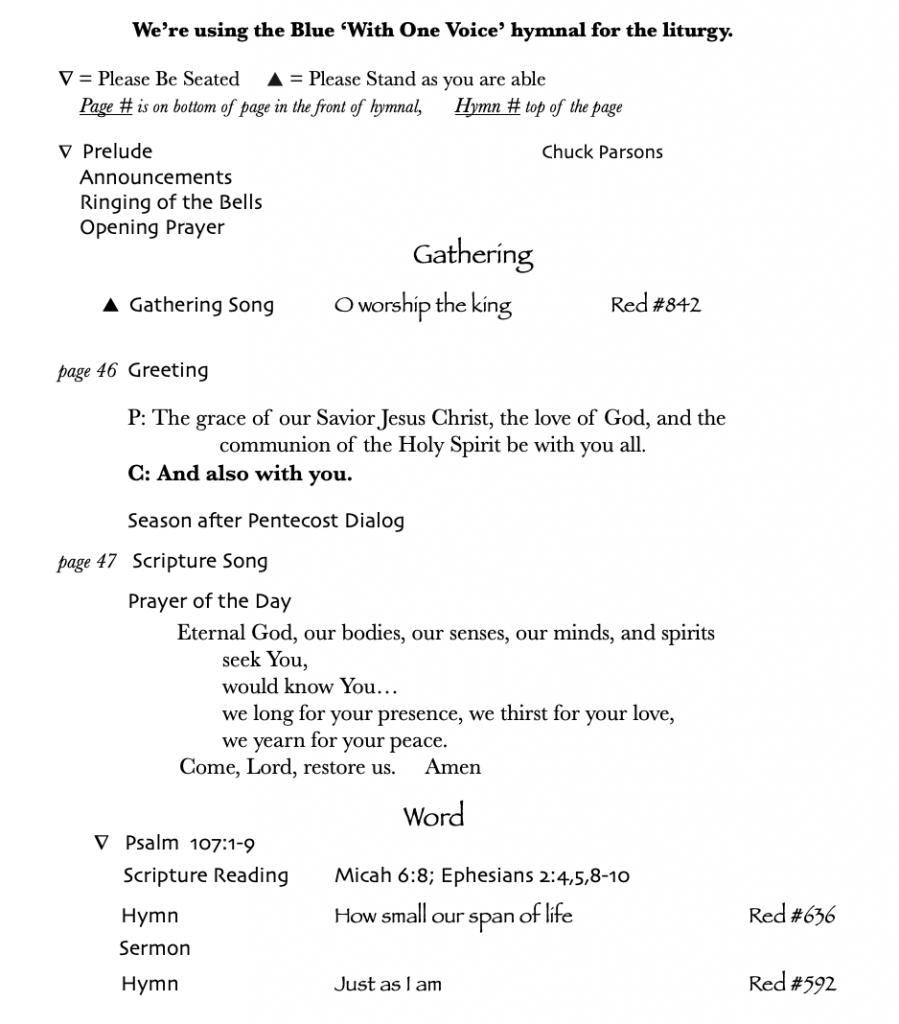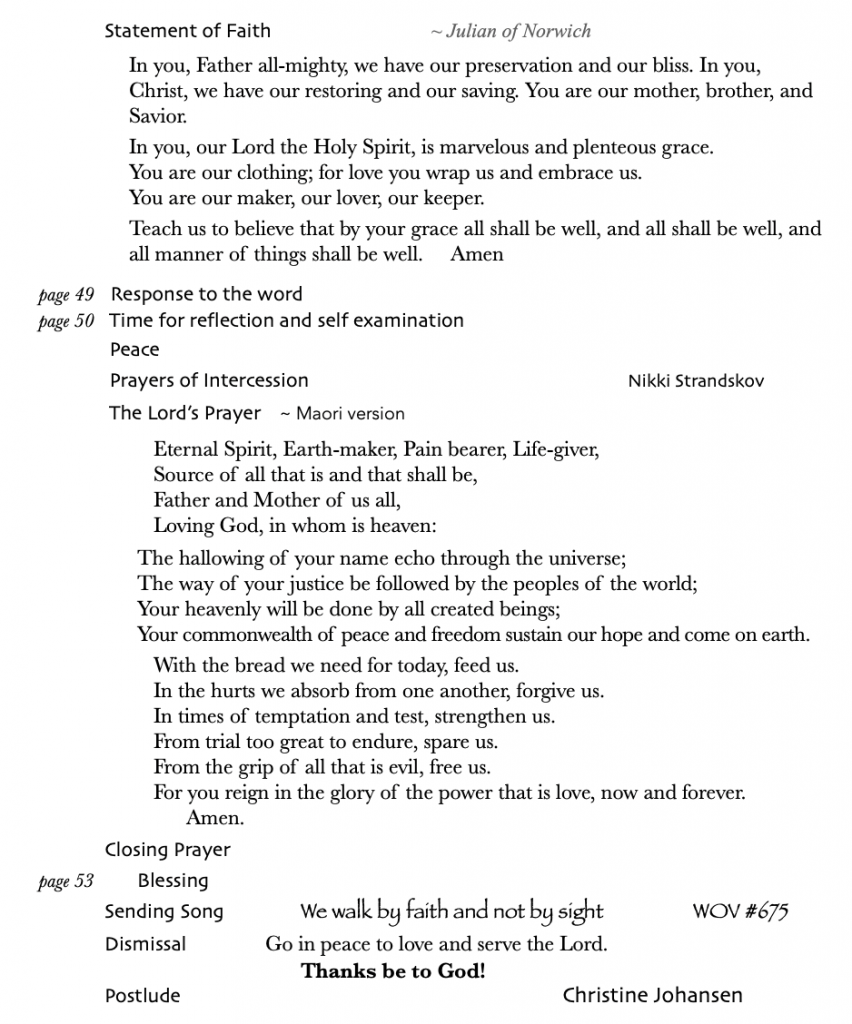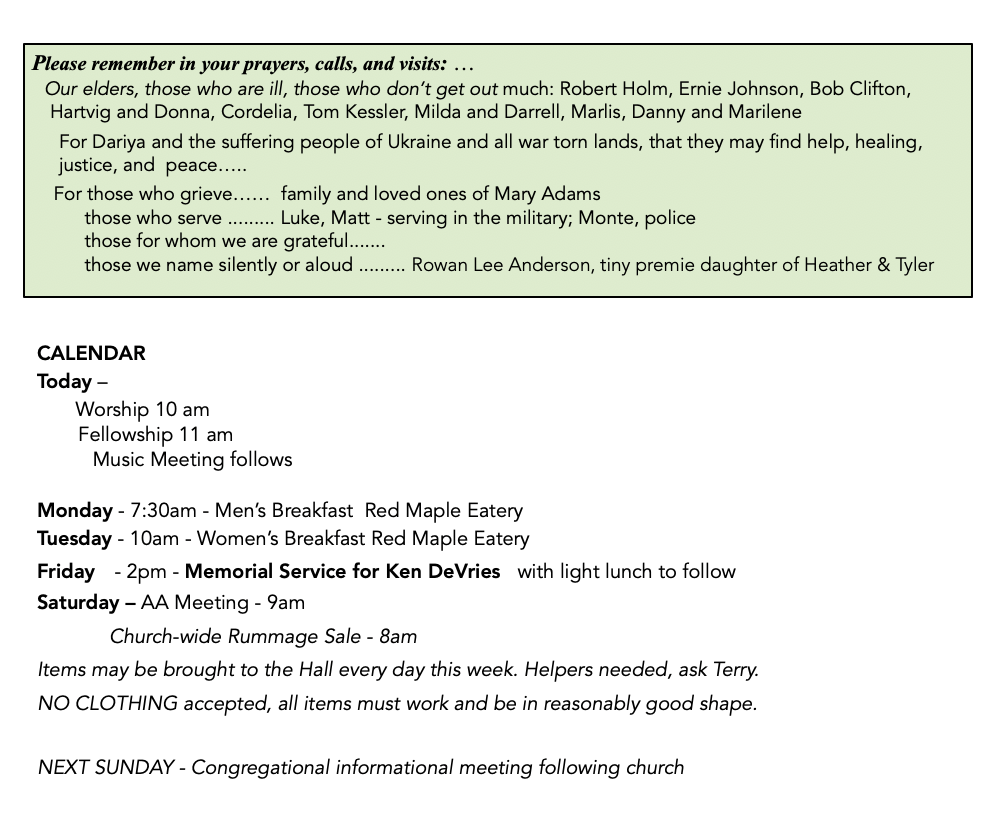Audio Recording

“He has shown you, O man, what is good; and what does the Lord require of you, but to do justly, to love mercy, and to walk humbly with your God?” Micah 6:8.
Ephesians 2:4 God, who is rich in mercy, out of the great love with which he loved us 5even when we were dead through our trespasses, made us alive together with Christ—by grace you have been saved—8For by grace you have been saved through faith, and this is not your own doing; it is the gift of God— 9not the result of works, so that no one may boast. 10For we are what he has made us, created in Christ Jesus for good works, which God prepared beforehand to be our way of life.
Yesterday was a perfect summer day – hot, but not humid, all-day sun with a few dainty cloud puffs, perfect.
I spent a perfectly good summer day following Wikipedia links though the history of hell. I picked the bulletin cover bouquet for cheerful company.
Why I would spend time learning about hell, you might ask. Our topic this month is faith, and isn’t the point of faith to avoid hell? Well, precisely.
Or is it?
I’m trying to discover what faith is, what it means to me and possibly to you – although, I’d like to hear it in your own words if you’d care to share them with me – and why we make such a big deal about faith.
Last week I took the definition from the book of Hebrews: faith is confidence in what we hope for, and assurance about what we do not see.
I visited with Tony Rolloff this week who pointed out that the same could be said about the Twins having a winning season – especially if you shorten the phrase to be hope for what we do not see. Which caused me to realize that religious faith, spiritual faith, is actually about something, there needs to be an object of that hope. And since I tend to jump to the outer extremes and work my way back in, I landed at the end point of faith, which is death and whatever lies beyond. Which is how I got to hell.
I think the average person, if asked what is the point of faith, would say, “So you don’t go to hell.” Or conversely, “So that you can go to heaven.”
Pretty simple. But is it true?
Is faith nothing more than life insurance, or fire insurance?
If faith is the way through the pearly gates, then those without faith, without religion, or the right kind of belief or religion, will be ferried across the River Styx into the underworld of death and demons, darkness and torture. Is it a simple two option fork in the road? I’ll stop asking questions I don’t let you answer and tell you first a bit about hell, and then we’ll get back to faith.
Hebrew Scriptures refer to Sheol – a subterranean underworld where all souls of the dead go after the body has died. Both the righteous and wicked share the same fate. The author of Ecclesiastes includes animals in that fate; saying we are no different in death. Sheol was cut off from the presence of God.
When the Hebrew scriptures were translated into Greek in ancient Alexandria around 200 BCE, the word “Hades” was substituted for Sheol because of its similarities to the Underworld of Greek mythology. Even though beliefs about Sheol and Hades were different, this replacement is reflected in the New Testament. Jesus tells the story of poor Lazarus who begs at a rich man’s gate. When he dies, Lazarus rises to sit by Father Abraham, while the rich man descends to Hades where he suffers and is told that he had all the advantages, even the warnings of the prophets, yet still he would not listen to the cries of those like Lazarus.
There is another biblical term that refers to the Hinnom Valley or Gehenna in Greek. It is an actual place outside the city walls of Jerusalem. Way back in the day, under the evil reigns of King Ahaz and his son Manasseh, children were sacrificed to the god Baal at Gehinnom and the place was cursed in the writings of Jeremiah and afterward became associated with divine punishment. In the gospel of Matthew, we hear of the wicked being thrown into Gehenna – into the utter darkness where there will be wailing and gnashing of teeth. Gehenna was also, according to some sources, the city garbage dump and so would have had an eternal fire.
However, the soul’s stay there is not everlasting – in Jewish thought, the sentence in Gehinnom is usually limited to a 12-month period of being refined before the soul takes its place in Olam Ha-Ba, or the World To Be. This 12-month limit is reflected in the yearlong mourning cycle and recitation of the memorial prayer for the dead. I also read that the rabbis tend not to teach much about heaven and hell because they prefer that people live in the present and on the earth with God and each other.
My afternoon of reading told me that our modern image of hell arises from an incorrect translation in the King James Bible conflating these two words, Hades and Gehenna, replacing them with the single Anglo-Saxon word Hell. So, unclear and inconsistent biblical imagery, pagan influence and mythologies, misinterpretation and the terror of life in the Dark Ages have embellished biblical understanding. When life was short, miserable, afflicted by plagues and war, people imagined the worst. If this was life for the average believer, what could the wicked be facing? An eternity of tortures. We have come to picture and assume more than the Bible actually says about the topic.
In 1999, Pope John Paul II said: “images of hell that Sacred Scripture presents to us show the complete frustration and emptiness of life without God. Rather than a place, hell indicates the state of those who freely and definitively separate themselves from God who is the source of all life and joy.”
I like that. And with it, we’re back to the topic of faith.
The absence of faith is a separation from God. It’s not hell, it’s not permanent, and it’s not by God’s will. Lack of faith limits the relationship with the divine, limits communication, limits the practice of putting oneself in the space of awareness of God’s presence.
So, if the point or purpose of faith is not to avoid negative consequences, and if it is more about faithful living than hopeful waiting for what is not yet seen, then it seems to me that maybe we make too big a deal about faith. It is listed as one of the spiritual gifts in the apostle Paul’s line-up:
1 Corinthians 12:4 Now there are varieties of gifts, but the same Spirit; 5and there are varieties of services, but the same Lord; 6and there are varieties of activities, but it is the same God who activates all of them in everyone. 7To each is given the manifestation of the Spirit for the common good. 8To one is given through the Spirit the utterance of wisdom, and to another the utterance of knowledge according to the same Spirit, 9to another faith by the same Spirit, to another gifts of healing, and so on. Not everyone is given the gift of faith They may be given a different gift from God’s pocket of gifts. Isn’t that interesting?
Martin Luther’s small catechism says: “I believe that I cannot by my own reason or strength believe in Jesus Christ, my Lord, or come to Him; but the Holy Spirit has called me by the Gospel, enlightened me with His gifts, sanctified and kept me in the true faith.” Faith is believed by Lutherans and many others to be a gift, rather than an act of will.
We talked about this in seminary quite a bit. I came away feeling that if the spirit of God calls, enlightens and bestows gifts, each different and for the sake of the common good, then it doesn’t make one less beloved by God if faith eludes you. You are likely behaving and believing in a manner just as pleasing (or just as confounding) to God as one who is ablaze with belief.
I’ve thought and wondered about faith for as long as I can remember, because I don’t feel anything. And because I think about faith, without knowing if I truly believe. I have intellectual faith, faithful imagination, eager hope for the mysteries I can’t understand, but I don’t think I possess the spiritual gift. I had a classmate in seminary who just about started crying when I said something similar because she believes without faith I’ll go to hell. She was completely baffled by the reading from 1 Corinthians. Living faithfully is our calling as Christians. Faith is not one of the 10 commandments. It is only in the gospels that we hear pressure to believe, and there were reasons for that urgency in their belief that Christ was about to return, within their lifetimes. There was urgency in committing oneself to the life of faith.
By far the emphasis of the biblical word is about living. Living with good courage and good will, working for the benefit of others and not only ourselves, intentionally putting yourself in the way of goodness, kindness, positive consideration of another’s position. These life skills are how we follow in God’s way and will shown us by Jesus. He talked about faith that can move mountains and faith the size of mustard seeds. He called disciples without first quizzing them about their faith or the quality of their mercy. He healed people who had great faith and those who had none.
Maybe we’ve made too much of faith, put too much emphasis on a spiritual gift that is not universally given, assigned too much guilt or shame to those who have the spiritual gift of doubt, or who just go on their merry way being good people without religion slowing them down.
I am not saying faith isn’t important, but I think it’s not everything. I think it provides comfort and reassurance and insight when it comes with wisdom. It can also create undo fear or worry when it is seen as the only way to be acceptable and pleasing to God. I think the way is broader than belief and that behavior is of at least equal importance if not greater importance. Paul does say love is the greatest of these three words we are considering – hope, faith and love.
I think if we followed in the path of mercy, compassion, humility over our part in the scheme of life, generosity of spirit and giving, openness to the mysteries of God revealed in the sacredness in all living things, we would have a very rich and fruitful spiritual life. Perhaps the point or purpose of faith is to see beyond the immediate grubbiness or pain or struggle. Maybe that’s why people often come to faith during a crisis or disaster. Maybe we are given the gift when we need it and it ebbs and flows throughout our lifespan like the breathing in and out of God’s Spirit.
“All shall be well and all shall be well and all manner of things shall be well.” Thank you Julian of Norwich – a sure and certain hope, a simple faith in what we cannot see – based on her vision of God’s love supporting and sustaining all of life.
So, what do you think?


